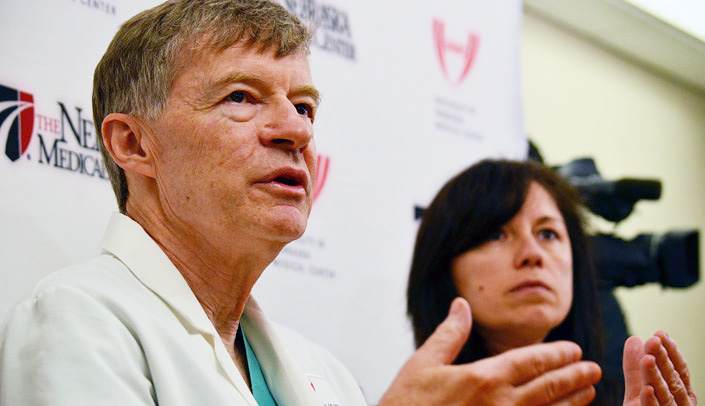Philip Smith, M.D., professor of internal medicine/infectious diseases at UNMC and medical director of the Biocontainment Unit, met with reporters Wednesday afternoon to discuss the medical treatment of Ashoka Mukpo, the second patient with Ebola to be treated at The Nebraska Medical Center.
The press conference followed news reports of the death in Dallas of Thomas Eric Duncan, the first patient diagnosed with Ebola while in the United States.
Dr. Smith said Mukpo would receive the same convalescent serum that Rick Sacra, M.D., did a few weeks ago, and it would come from the same donor — Kent Brantly, M.D.
The serum “will buy some time for our patient to fight (the disease) off himself,” Dr. Smith said. He cautioned, though, that “this is not like giving penicillin for pneumonia . . . often the improvement is subtle.”
In addition, Mukpo has received Brincidofovir, made by Chimerix, a biopharmaceutical company. The decision to use the drug was made after looking at the data on the drug, collaborating with the CDC and FDA and speaking with the patient and his family, Dr. Smith said.
Although some hallmarks of Ebola care have been established — get fluids in the patients early, keep electrolyte levels balanced — Dr. Smith told reporters that there was no textbook for treating Ebola, and that different patients were likely to receive different treatments as knowledge of effective treatment methods evolved.
Dr. Smith described Mukpo’s condition as “sick, but stable.”
He said that the Biocontainment Unit staff had learned a lot from caring for Dr. Sacra about the course of the disease, and that Mukpo was “following the path we expected.”
Dr. Brantly, who donated blood to help Dr. Sacra, was traveling through Kansas City when he received a call from UNMC’s Angela Hewlett, M.D., on Oct. 7 asking him to donate blood for Mukpo. His blood was flown to Omaha and was scheduled to be given to Mukpo yesterday.
“It’s not a likely scenario that he would again have the same blood type,” said Dr. Hewlett, associate medical director of the Biocontainment Unit and associate professor of internal medicine/infectious diseases at UNMC. “We are incredibly grateful that Dr. Brantly would take the time to do this, not once, but twice.”
Diana Florescu, M.D., associate professor, internal medicine-infectious diseases, said Mukpo had received one dose of Brincidofovir so far, on Monday. She said there was no clear data on how the transfusion from Dr. Brantly would interact with the drug.
“It really is a moving target . . . because there’s no established treatment,” Dr. Smith said.

I would assume the Ebola treatment unit has numerous high quality video cameras to observe real time and record all activity for future reference to preclude breaches in safety, I wonder if in Dallas and elsewhere the treatment and personnel clothing areas are also videoed?.